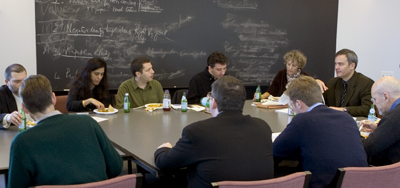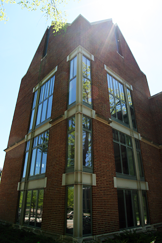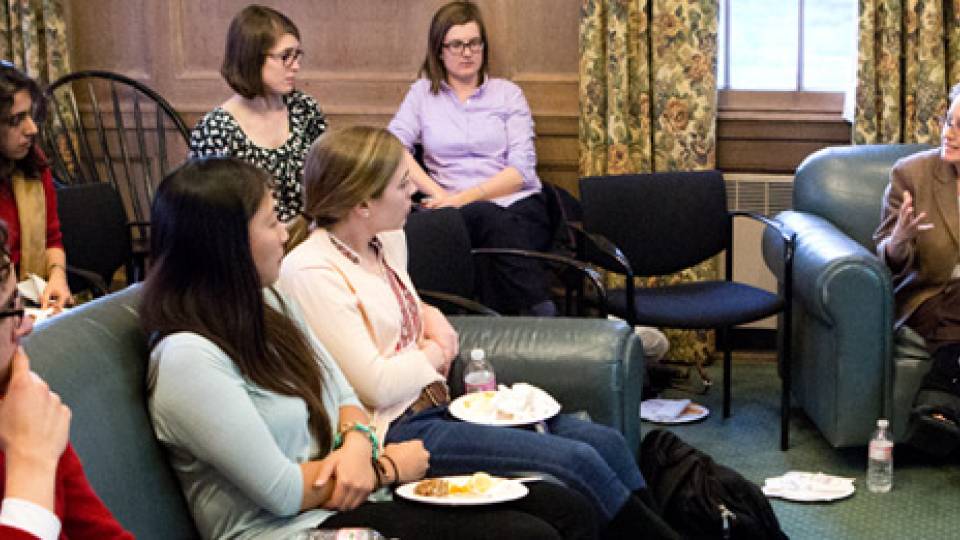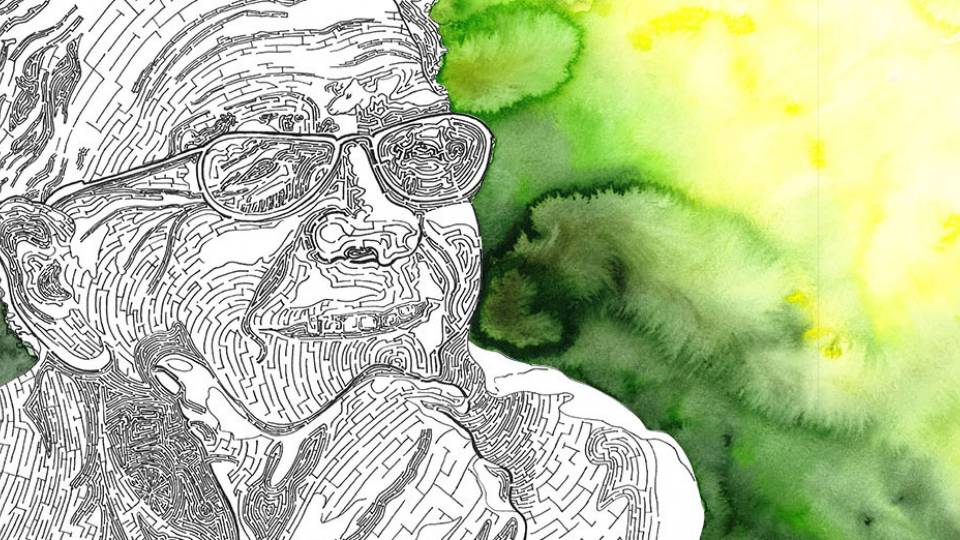From the Feb. 27, 2006, Princeton Weekly Bulletin
The quiet confines of Marx Hall disguise an industrious hive of intellectual activity on Princeton’s campus. The University Center for Human Values, which makes its home here, attracts scholars and sponsors offerings that inform the academic curriculum, generate novel research and ignite public debate.
The center’s purpose is to foster inquiry into important ethical issues in private and public life. Director Stephen Macedo describes it as a “very exciting place to be,” where it is possible to “think about big questions and discuss matters of great interest with students and colleagues from across the University and around the world.” He points to the interdisciplinary nature of the center as one of its most important qualities, ensuring that scholars and students share ideas and crisscross academic fields.
Created in 1990 through the support of Laurance S. Rockefeller, a member of the class of 1932, the center has established itself as a powerhouse of scholarly discussion on the campus. Currently it has eight core faculty members, seven of whom hold joint appointments with other departments; a cohort of 45 faculty associates; seven visiting scholars from around the world; and eight postdoctoral and graduate student fellows. Undergraduate students also have an impact on center programming through the Undergraduate Human Values Forum and a new film forum.

With Macedo at the helm, the center is led by an 11-member executive committee comprising faculty with appointments in the center as well as several others. The founding director of the center was Amy Gutmann, now president of the University of Pennsylvania; George Kateb, the William Nelson Cromwell Professor of Politics Emeritus, also served as director and acting director.
Throughout the academic year, the center sponsors an extensive range of courses, seminars and public lectures. It has direct links with other campus entities, including the Program in Law and Public Affairs, the Center for the Study of Democratic Politics and the Society of Fellows in the Liberal Arts. Working closely with academic departments, it also supports faculty hires, helps fund undergraduate courses and graduate research and cosponsors conferences and guest lectures.
According to Macedo, it is the center’s ability to attract and retain faculty, often in joint hires with academic departments, that is one of its main successes. By supporting new faculty, it helps to shape the curriculum. For example, along with the philosophy department, the center currently is finalizing searches for two new faculty members in bioethics. The expectation is that more course offerings in the field will allow for an undergraduate certificate program in bioethics.
Intellectual depth and breadth
For faculty, the center is a nexus for the exchange of information and a sounding board for new ideas. “While the core interests of the center are political theory, ethics and public institutions, we go beyond the core to pursue a wide range of value questions,” said Macedo. “All of the center’s faculty are interested in real phenomena — in actual institutions and policies.”
The real-world issues in which faculty engage are manifold, but Macedo highlighted a few examples. “Josh Ober, Philip Pettit and I are interested in democratic institutions, and we are all involved in various ways in thinking about fundamental democratic principles and how democracy could work better from the standpoint of citizen participation,” he said.
“Peter Singer studies and writes about some of the most difficult controversies surrounding the beginning and end of human life as well as animal rights and our duties with respect to global poverty and the environment,” he continued. “Kim Scheppele teaches and writes about torture and emergency powers as well as the role of courts and constitutions in transitions to democracy. Anthony Appiah has just published a book that is already being widely discussed on cosmopolitanism, culture and identity [“Cosmopolitanism: Ethics in a World of Strangers”] — an article of his about this was published at the beginning of the year in The New York Times Magazine.
“Nan Keohane works on inequality and leadership, which I’m sure will be much talked about since she’s drawing on years of scholarly reflection as well as her wide-ranging experience as a former university president [at Wellesley and Duke],” he said, “and Victoria McGeer is a research scholar who works on the mind, including puzzles surrounding autism.” Further, Christopher Eisgruber, the University provost, is a specialist in constitutional theory.
According to Singer, the Ira W. DeCamp Professor of Bioethics, the intellectual pursuits of center faculty and fellows inform his own work. “I’ve spent my life thinking and writing about issues that raise questions about our values, and it’s been immensely stimulating to have a group of terrific colleagues from different disciplines all thinking about values in different ways.”
Singer said that he has benefited from the center’s seminars, where faculty and visiting fellows present work in progress. “I wrote ‘One World: Ethics and Globalization,’ which I am sure I would never have thought of writing if I had been working only among philosophers,” he said. “And then there is my book on Bush — ‘The President of Good and Evil’ — that was the result of exposure to ways of discussing issues that are more common at the center than in philosophy departments. That’s the cross-disciplinary influence — the center has exposed me to a wider range of political discussions. But I’ve also tried out [at center seminars] my more basic ideas on the nature of ethics, as well as a chapter from my forthcoming book, ‘The Way We Eat: Why Our Food Choices Matter.’”
Pettit, the Laurance S. Rockefeller University Professor of Politics and the University Center for Human Values, echoed Singer’s comments about the intellectual advantages afforded by the center. “The center gives me access to colleagues in different disciplines, with whom my interests overlap, and it provides a forum where relevant interdisciplinary events, of interest to both faculty and students, can take place,” he said.
This academic year, Pettit launched the Democracy and Human Values Project at the center to focus on questions about the foundation of democracy, its role and design. “My principal research interests at the moment are in the nature of collective action and corporate agency,” he said. “Theorizing on these topics involves philosophical and economic techniques and needs to be informed by legal theory and the history of ideas.” To pursue this project, he is working closely with Christian List, a social choice theorist visiting this semester from the London School of Economics and Political Science.
Ober, the David Magie Class of 1897 Professor of Classics, emphasized the importance of the center in helping him to connect research and teaching. “Since I came to Princeton in 1990, the center has had a major impact on the direction of my research and teaching,” he said. “The chance to interact with extraordinary scholars and students, across disciplines and in intensive seminars, led me to become considerably more philosophical in my approach to ancient Greek history, and helped me to see new ways in which the Greek past could be made relevant for contemporary thinking.
“The chance to teach classes related to my research — for example the undergraduate course on participatory democracy I am offering this spring — has allowed me to move seamlessly between scholarship and teaching,” said Ober.
For the seven or so visiting faculty fellows who are admitted to the center annually — out of more than 120 applicants — the opportunity to pursue their own research and present it in progress is invaluable.
Angelika Krebs, a Rockefeller Visiting Fellow from the University of Basel in Switzerland, is spending her year at the center writing a book about the nature of love. Describing the experience thus far, she said: “There is so much going on at the center, especially in political philosophy and bioethics, you hardly have to step out of your door to meet the most inspiring scholars in the field.” Krebs said she finds the seminars particularly stimulating, with general discussions that are “extremely lively and supportive.”
Teaching and public discourse
The cross-disciplinary emphasis of the center and its commitment to public discourse help shape the academic curriculum and generate discussion of values questions across the University community.
One of the major ways the center enhances the undergraduate curriculum is through its freshman seminars. Each year it offers seven endowed freshman seminars, and supports nearly twice as many as that, with titles such as “Empire and International Justice”; “The Ghetto as a Socio-historical Problem”; and “Sex, Money and Rock-and-Roll: Information Technology and Society.”
Macedo recalls the freshman seminar he has led — “Religion and Politics” — as the “best teaching experience I’ve ever had in my life.” While espousing diverse viewpoints, the students were “respectful of one another even while the discussions were so intense,” he said. In fact, the classes were so impassioned that he “would come out hoarse, and at the end of the seminar the class gave me a gavel because I’d had to bang my hand on the table to quiet things down.”
Stating that “you can’t go wrong teaching ethics and public policy” to Princeton undergraduates who “love the subject matter,” Macedo also emphasized the “beyond-the-classroom dimension” of the center.
A key example of this dimension is its Undergraduate Human Values Forum, which empowers students to pursue particular topics of interest with center faculty over biweekly dinner discussions.
Junior Joe Cho, the president of the forum, said that the “topics of our discussion fall under the broad category of ‘ethical inquiry,’ which leaves enough room to discuss just about anything.” He said that the discussions help students explore ideas in a group setting and encourage openness to varying viewpoints.
“We have fellows who are seniors and some who are freshmen; some who are molecular biology majors and some who are religion majors,” he said. “We have students from all around the world, and students with views and beliefs from all across the spectrum of ideology.”
The forum also plans special programs and events. For example, Cho said that last semester, senior Lauren Bush, the special events coordinator, organized a day trip to the United Nations in New York, which included a guided tour and meetings with nonprofit organizations about food aid.
The center also provides opportunities and resources for graduate students. In particular, doctoral students working on interdisciplinary dissertations in ethics and human values may apply for a Graduate Prize Fellowship, which provides a stipend and office space. As part of the program, the fellows meet once a week to discuss each other’s work.
Both David Dillenberger and Philipp Sadowski, doctoral candidates in economics, currently hold center fellowships and are working on a joint research project. According to Sadowski, being associated with the center is important in their work to develop a theoretical model regarding social behavior in the context of choice theory and behavioral economics. “We are interested in the norm of ‘fairness,’” he said, “and this question is relevant in the context of human values. Discussing it with fellows and faculty from a different perspective is very productive.”
In its broadest educational role, the center sponsors a series of public lectures — such as the DeCamp Bioethics Seminars, the Tanner Lectures on Human Values and the Moffett Lectures on Ethics — that present eminent speakers on a range of timely topics.
Singer, who oversees the DeCamp seminars, said he has been “delighted that the center has given me the opportunity to organize these events and to invite to Princeton the people doing the most challenging and stimulating work in bioethics.”
Working with Singer is Nir Eyal, who holds the Harold T. Shapiro Fellowship in Bioethics at the center — a postdoctoral position with teaching responsibilities. Eyal said the talks “seek to bring together and sustain a dialogue among philosophers, scientists, health economists and other experts.”
Topics this semester include a discussion of pharmaceutical research, advanced medicine and the world’s poor; and a debate, which will include Singer, on abortion and infanticide.
“I cannot imagine a more interesting or important mandate than the one we have at the University Center for Human Values,” said Macedo. “I know that folks at other universities are seeking to emulate what we do, and I feel awfully lucky to be able to help support this phenomenal range of discussion, teaching and research.”
A calendar of events sponsored by the center is available on the Web.


